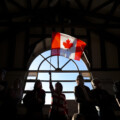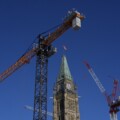Welcome to Need to Know, your Saturday dive into thought-provoking research from think tanks, academics, and leading policy thinkers in Canada and around the world, curated by The Hub. Here’s what’s got us thinking this week.
The events that have played out over the last few months may leave a bitter taste in our collective mouths for what 2025 will bring. The Middle East looks like it’s on the brink of collapse. The re-election of Donald Trump is bringing about profound uncertainty for policymakers across the globe. South Korea had an attempted coup. Incumbent governments around the world had an awful year. Oh, and at the same time, the Canadian government looks like it’s about to explode.
In other words, if order and stability in domestic and international policy-making are on your New Year’s resolution list, you might as well just cross them off now.
Given the uncertainty of what’s to come, today, we bring you a few longer reads for the holiday break to help make sense of the bumpy road ahead. The long and short of it is buckle up; 2025 looks like it could be a wild ride.
Escalating wars, advancing technologies
Ian Bremmer is one of the world’s foremost geopolitics experts, leading the Eurasia Group consulting firm. He is someone worth listening to when trying to figure out where the world is headed.
In his 2024 State of the World address, Bremmer presented a sobering yet balanced assessment of global dynamics, emphasizing a world marked by intensifying geopolitical conflicts and transformative technological advancements. Speaking in Tokyo on October 23, Bremmer identified the war in Ukraine, the Israel-Palestine conflict, and deteriorating U.S.-China relations as pivotal crises shaping the global landscape. He warned that these tensions, compounded by nuclear proliferation risks, are pushing the world toward the brink.
Bremmer highlighted Putin’s potential use of tactical nuclear weapons in Ukraine, North Korea’s military support of Russia, and Iran’s growing nuclear ambitions amid Middle East turmoil. These developments, he argued, could encourage countries like Japan and South Korea to reconsider their non-nuclear stances, further threatening regional and global stability.
Despite these pressing concerns, Bremmer pointed to opportunities driven by technological advancements. He described a global landscape where the middle class continues to expand, propelled by digital connectivity. While the U.S. leads in artificial intelligence innovation, China is dominating in renewable energy technologies, including electric vehicles and solar power. This competition, he noted, is compelling other nations to engage strategically with both powers simultaneously, maintaining an international balance that prevents complete geopolitical decoupling.
Bremmer underscored the paradox of a world teetering between escalating conflicts and extraordinary technological progress. He urged global leaders to navigate these dual realities by addressing instability while harnessing the transformative potential of innovation, offering a cautious but optimistic path forward.
Human freedom is in decline
In the introduction to Capitalism and Freedom, Milton Friedman reminds us that, “Freedom is a rare and delicate plant. Our minds tell us, and history confirms, that the great threat to freedom is the concentration of power.” Yet, the concentration of economic and political power within countries has risen in recent years.
A case in point is the recent findings from the 2024 Human Freedom Index, published by the Cato Institute and Fraser Institute. The index delivers a comprehensive analysis of global human freedoms across 165 jurisdictions based on the combination of data from personal, civil, and economic indicators from 2000 to 2022.
This year’s report reveals a troubling trajectory for human freedom.
The study ranks countries based on 86 metrics, including rule of law, freedom of expression, association, and economic liberties like trade and property rights. Switzerland, New Zealand, and Denmark top the rankings, exemplifying robust freedom frameworks. Canada finds itself ranking 11th, with the U.S. and U.K. tied for 17th.
On the opposite end, countries like Syria, Yemen, and Iran reflect systemic constraints on freedom, ranking at the bottom of this year’s index. Notably, the index highlights that only 14.1 percent of the global population lives in jurisdictions classified within the top 25 percent of the freest countries.
What is most troubling is that between 2019 and 2022, 87.4 percent of the world’s population saw a decline in their levels of human freedom.
The findings serve as a wake-up call, emphasizing the essential role of freedom in fostering prosperity and stability. Policymakers are urged to recognize the intrinsic value of protecting liberties across political and economic dimensions, given the positive connection that freedom has to higher income levels, better life satisfaction, cleaner environments, and much more.
Don’t forget about the importance of markets for lifting people up
Market bashing is in vogue again, whether it’s the Left’s resurgent complaints about capitalism or the Right’s newfound love of the state as the primary driver of economic activity.
Both sides of the political spectrum in the U.S. and elsewhere are embracing domestic industrial policy, protectionism, and other government interventions despite the lessons of history that prove these policies are often enacted at the expense of the least fortunate among us.
This is what Glenn Hubbard, a professor of economics and finance at Columbia University and former chairman of the Council of Economic Advisers under President George W. Bush, reminds us in his recent National Affairs essay “Markets for the People.”
In the essay, Hubbard critiques the Biden administration’s economic strategy, dubbed “Bidenomics,” for its heavy reliance on industrial policy. He argues that initiatives such as the CHIPS and Science Act and the Inflation Reduction Act, which channel substantial government investment into sectors like semiconductors and electric vehicles, reflect a top-down approach to economic intervention. While these policies aimed to address challenges like globalization and technological disruption, Hubbard asserts they have not effectively delivered broad-based economic benefits to Americans.
Hubbard also critiques a similar trend among some conservatives, who have embraced protectionist policies, including tariffs and domestic manufacturing subsidies. For instance, President-elect Trump has threatened to implement 25 percent tariffs on imported goods from Canada and Mexico in a move that would impoverish all three countries. Hubbard views such strategies as misaligned with the historical successes of open markets and competition, which have driven innovation, economic growth, and poverty reduction globally.
Rather than advocating for state-directed economic management or an unregulated free market, Hubbard calls for a renewed focus on classical liberal principles. He emphasizes that conservatives should champion policies designed to enhance competition and opportunity within markets. However, it’s not enough to simply open markets to competition and hope that economic opportunity will expand. For example, Hubbard makes the case that there is a legitimate role of the state to expand enrollment in vocational programs so that individuals can take advantage of the opportunity that competition creates.
This approach of focusing on both competition and opportunity, he argues, can effectively address economic disruptions while ensuring the gains from growth are equitably distributed. To paraphrase Hubbard, markets are not ends themselves, they are tools that lead to human flourishing.
Hubbard proposes that prioritizing competitive, open markets over centralized industrial policies can empower individuals and businesses to adapt to globalization and technological change. By placing people’s opportunities at the core of economic policy, he concludes, policymakers can foster an inclusive economy that benefits all citizens and strengthens the foundation of democratic capitalism.
ChatGPT assisted in the creation of this article.











